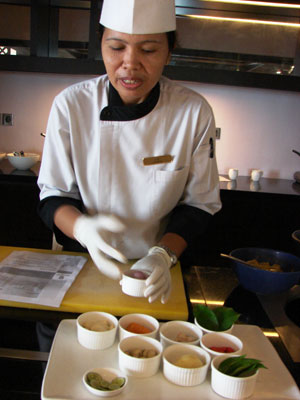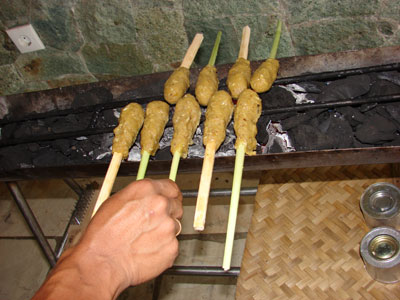What's Cooking in... Bali
This item appears on page 58 of the October 2013 issue.
When my husband, John, and I were making arrangements for a March ’13 hotel stay in Bali, Indonesia, we were advised that we could not arrive on March 12th because that was Nyepi Day, the Balinese day of silence, a 24-hour respite from all noise. Even the airport is closed.
We stayed at the Pan Pacific Nirwana Bali Resort (Jalan Raya Tanah Lot, Box 158, Tabanan 82171, Bali, Indonesia; phone, in US, 877/324-4856). The rate for a room booked online at that time was $195. We paid a media rate of $125 per night plus tax.
While most of the people in Indonesia are Muslim, the majority of the people in Bali are Hindu, and the Hindu influence is evident in the shrines and statues found in various spots on the Pan Pacific Nirwana’s property.
The hotel offers a 2-hour cooking experience to guests for $30 per person, with a minimum of two participants. (Our class was complimentary.) We find cooking classes to be value-laden because each learning opportunity provides, in addition to knowledge, a meal.
Before our cooking class, we walked across the hotel’s golf course and past the rice paddy (the hotel has its own rice fields to supplement its larder) to Tanah Lot Temple, a picturesque Hindu temple built on a rocky outcropping just offshore. It is a popular pilgrimage site.
We were unable to wade out to the temple because, since the bombing incidents in Bali in 2002 and 2005, it has been closed to visitors except during special events.
The chef leading our class was M. Kadek Ari Utami. From her name, we knew that she was her parents’ second child. The Balinese traditionally indicate their children’s birth order in their names. “Kadek” indicates “second born,” just as “Wayan” indicates “first born,” “Nyoman” is reserved for the “third born” and the “fourth born” is “Ketut.” A fifth child may be called “Wayan Balik,” which means “Wayan again.” And so it goes.
Our cooking class included three typically Balinese dishes: a salad, a dessert and fish satays. I found the Minced Fish Satay interesting because all the satays I had previously experienced used strips of meat, like chicken.
I loved the addition of ginger, lemongrass and chili to the minced fish. It was a great taste treat.
3 tbsp fried shallots (or onion)
5 shredded lemon leaves (remove stems)
1 tbsp palm sugar (or dark brown sugar)
1 tbsp shrimp paste
3 tbsp thick coconut milk
5 cloves garlic
1 oz fresh ginger, grated
2 tbsp turmeric
1-2 stalks lemongrass
1 oz galangal, grated (if available)
½ oz red chili, minced
½ oz bird’s-eye chili, minced
3 kaffir lime leaves, minced (can substitute bay leaves)


